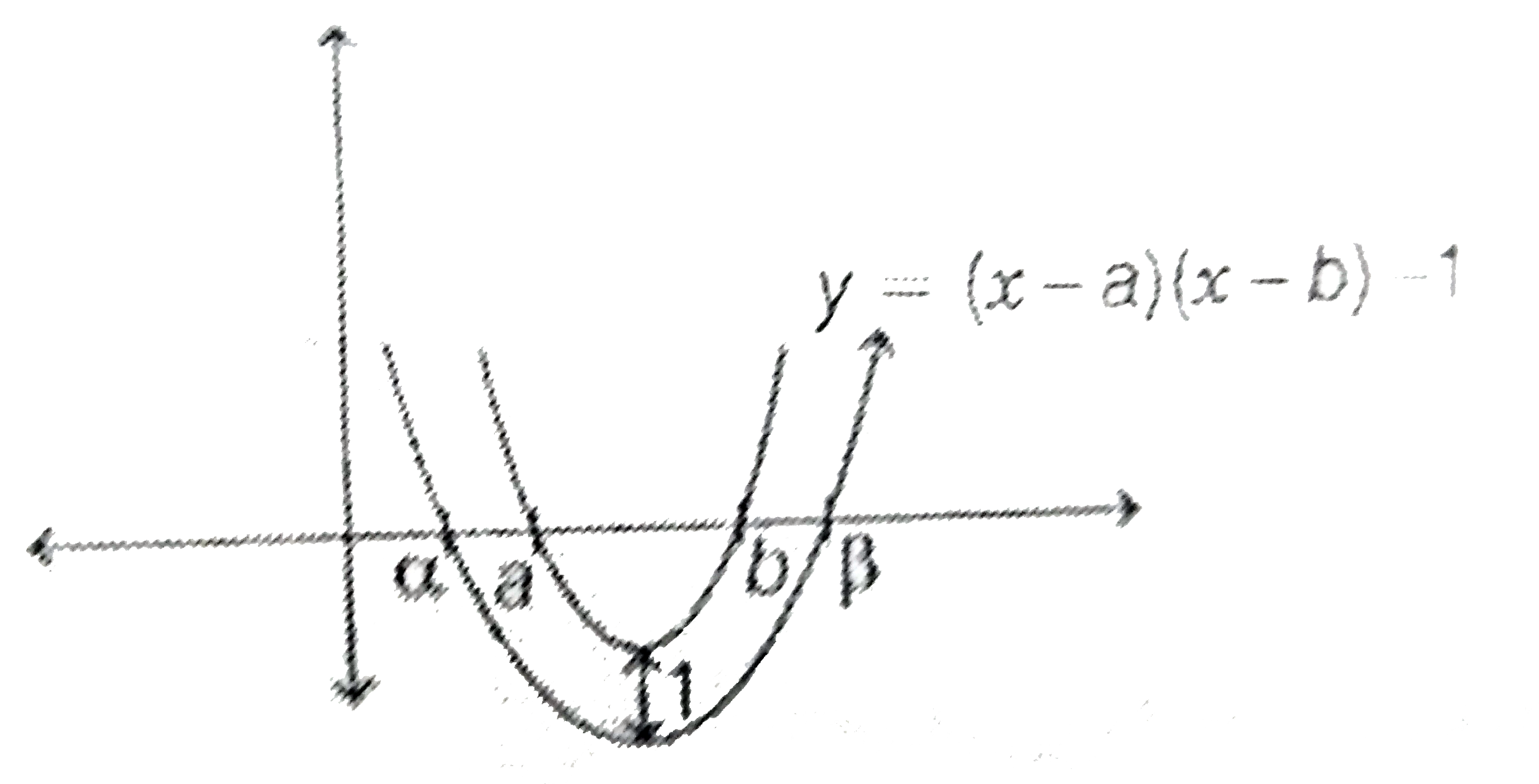If b>a, then the equation (x−a)(x−b)−1=0, has
both roots in (a,b)
both roots in(−∞,a)
both roots in (b,+∞)
one root in (−∞,a) and the other in in (b,∞)
The correct Answer is:D

From graph, it is clear that one of the roots of (x−a)(x−b)−1=0 line in (−∞,a) and other lies in (b,∞).
Topper's Solved these Questions
- BOOK - IIT JEE PREVIOUS YEARCHAPTER - THEORY OF EQUATIONSEXERCISE - SOME SPECIAL FORMS18videos
THEORY OF EQUATIONS
- BOOK - IIT JEE PREVIOUS YEARCHAPTER - THEORY OF EQUATIONSEXERCISE - TRANFRORMATION OF ROOTS2videos
THEORY OF EQUATIONS
- BOOK - IIT JEE PREVIOUS YEARCHAPTER - STRAIGHT LINE AND PAIR OF STRAIGHT LINESEXERCISE - GENERAL EQUATION OF PAIR OF STRAIGHT LINES (Objective Questions I) (Only one correct option)1videos
STRAIGHT LINE AND PAIR OF STRAIGHT LINES
- BOOK - IIT JEE PREVIOUS YEARCHAPTER - TRIGONOMETRICAL EQUATIONSEXERCISE - TOPIC 3 PROBLEMS BASED ON MAXIMUM AND MINIMUM OBJECTEIVE QUESTIONS I (ONLY ONE CORRECT OPTION)9videos
TRIGONOMETRICAL EQUATIONS
Similar Questions
If b>a, then the equation (x−a)(x−b)−1=0 has (2000,1M) both roots in (a,b) both roots in (−∞,a) both roots in (b,+∞) one root in (−∞,a) and the other in (b,∞)
View SolutionIf a<b<c<d, then the equation (x−a)(x−c)+2(x−b)(x−d)=0 has ( a) Imaginary roots (b) equal roots (c) distinct real roots (d) none of these
View Solution
Knowledge Check
- Question 1 - Select One
If b>a, then the equation (x−a)(x−b)−1=0 has,
Aboth roots in [a,b]Bboth roots in (−∞,0)Cboth roots in (b,+∞)Done root in (−∞,a) and other root in (b,+∞) - Question 2 - Select One
If the equation x3+ax2+b=0(b≠0) has a double root then
Aa2+2b=0Ba2−2b=0C4a3+27b+1=0D4a3+27b=0 - Question 3 - Select One
The equation (b−c)x2+(c−a)x+(a−b)=0 has
Aequal rootsBirrational rootsCrational rootsDnone of these
If |a|<|b|,b−a<1anda,b are the real roots of the equation x2−|α|x−|β|=0, then the equation log|b|∣∣xa∣∣−1=0 has
View SolutionIf (a+b+c)>0anda<0<b<c, then the equation a(x−b)(x−c)+b(x−c)(x−a)+c(x−a)(x−c)=0 has (i) roots are real and distinct (ii) roots are imaginary (iii) product of roots are negative (iv) product of roots are positive
View SolutionIf a,b∈ R and the equation x2+(a−b)x+1−a−b=0 has unequal roots for all b∈ R then a can be
View SolutionStatement-1 : f(x)=0 has a unique solution in (0,π). Statement-2: If g(x) is continuous in (a,b)andg(a)g(b)<0, then the equation g(x)=0 has a root in (a,b).
View SolutionIf 1√αand1√β are the roots of equation ax2+bx+1=0(a≠0,(a,b∈R)), then the equation x(x+b3)+(a3−3abx)=0 has roots -
View Solution

